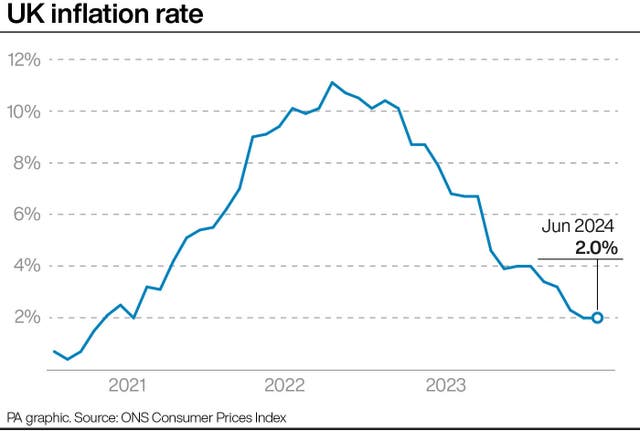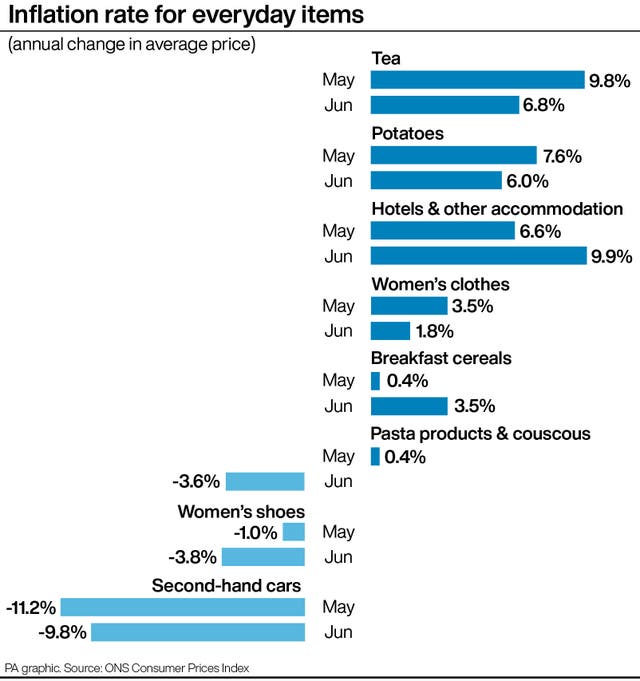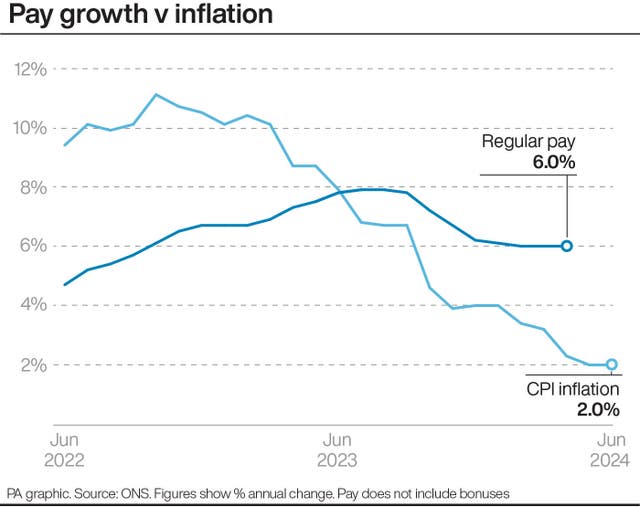UK inflation stays at 2% despite surge in hotel prices
The rate of Consumer Prices Index inflation remained unchanged at 2% in June, the Office for National Statistics said.

Inflation in the UK held steady last month with cheaper clothes prices balanced out by a surge in the cost of hotels amid a busy summer of events, official figures showed.
The rate of Consumer Prices Index (CPI) inflation remained unchanged at 2% in June, the Office for National Statistics (ONS) said.
It means that prices are still rising but at a rate that the central bank is comfortable with, after nearly three years of above-target inflation fuelling the cost-of-living crisis.
June’s rate came in slightly ahead of expectations, as some analysts were predicting it to dip below target to 1.9%.
The latest data showed that climbing hotel and restaurant prices were the biggest factors putting pressure on the overall rate of inflation last month.
The price of hotels soared by 8.8% in June compared with May, the ONS said.
It came amid a busy month of events and live music, with Taylor Swift embarking on her sold-out arena tour in cities across the UK.
Luke Bartholomew, deputy chief economist for Abrdn, suggested that the “so-called Taylor Swift effect” could have helped drive higher prices during the month, and as fans spent more on overnight stays during the Eras tour.

The ONS data also showed that the costs of package holidays, cinemas, theatres and concerts were rising.
But prices of clothing and footwear fell last month, which helped bring down the overall rate.
Food and drink inflation has also dropped sharply from the highs of recent years, coming in at a rate of 1.5% in June.
At one stage it reached nearly 20%, in March last year, as households faced much higher prices in supermarkets and restaurants.

Services CPI inflation – which looks only at services-related categories like hospitality and culture and is watched closely by the Bank’s interest rate-setters – was unchanged at 5.7% in June.
This could present a problem for the Bank after some economists had been expecting the rate to slow last month.
Laura Suter, director of personal finance for AJ Bell, said services inflation represents a “thorn in the Bank of England’s side”, adding: “This sticky element of inflation is of big concern to the Bank and even a small drop in the right direction would have given more confidence that now is the right time for interest rate cuts.
“But there are some big bright spots for consumers,” she went on.
“Food and alcohol prices rose by 1.5% in June, compared to 17.4% a year earlier, showing just how much food inflation has been tamed.
“The football effect is likely to have played a part in that, with supermarkets discounting alcohol and snacks to lure in more customers during the Euros.”

Meanwhile, June’s official inflation data is the first to be released since the UK welcomed a new Government at the beginning of this month.
Chief Secretary to the Treasury Darren Jones said: “It is welcome that inflation is at target, but we know that for families across Britain prices remain high.
“We face the legacy of 14 years of chaos and economic irresponsibility.
“That is why this Government is taking the tough decisions now to fix the foundations so we can rebuild Britain and make every part of Britain better off.”
The pound surged against the US dollar on Wednesday morning, rising about 0.45% to 1.3 dollars, the highest level in a year.
It suggests the pound was strengthening on predictions that interest rates could be kept the same in August.





